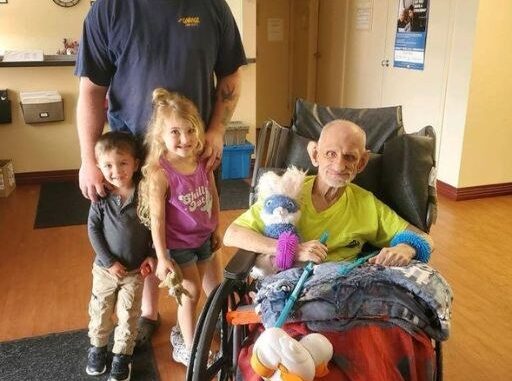
We began going to the nursing home every other Sunday, mostly because I needed somewhere to take the kids while my wife worked her long shifts at the hospital. The place always carried a strange mix of lemon cleaner and something heavier—an emptiness you could feel in the air.
Most of the residents would wave politely when we walked through. Some sat staring into nothing, others drifted off mid-sentence. I always thought our presence was just a tiny break in their otherwise endless days.
That changed when we met Mr. Reuben.
He didn’t speak. He didn’t look up. The staff quietly warned us not to expect much—after a stroke the previous spring, he had stopped engaging with anyone.
That morning, my daughter Scarlett clutched her stuffed dinosaur, a floppy green toy with one button eye and a tail that had been stitched back on more than once. She carried it everywhere.
Without hesitation, she walked over to Reuben, climbed onto the bench next to him, and held the toy out like it was the most important gift in the world.
“This is Chomp,” she explained. “He only has one eye now, but he’s not scary anymore. You can hold him if you like.”
At first, nothing.
Then Scarlett gently set Chomp in his lap.
Reuben’s fingers twitched—just a fraction at first, then more. Slowly, shakily, he lifted the dinosaur into his hands, holding it as if it were precious. Scarlett leaned close and whispered, “He likes hugs, too.”
And that’s when it happened—Reuben turned his head, trembling, and gave a faint but unmistakable smile.
Not wide. Not dramatic. But real.
Then, in the faintest voice, he whispered, “Thank you.”
The nurse gasped. My son froze. I stood rooted to the spot, witnessing a wall of silence begin to crack.
The next Sunday, Scarlett raced ahead with Chomp in her arms. This time, Reuben was already upright in his chair, waiting. His hands rested on his knees like he knew she was coming.
“Hi, Mr. Reuben!” Scarlett chirped. “I thought maybe you’d miss Chomp, so I brought him back.”
Reuben blinked, his lips curling into a soft smile. He reached for the toy without hesitation. And then, to everyone’s shock, he said Scarlett’s name.
“You’re kind,” he told her.
Scarlett grinned. “Chomp thinks so too!”
From then on, our visits were different. Reuben began speaking again—short phrases at first, then fragments of memories. He told us about fossil hunting as a boy, and about the first time he saw a dinosaur skeleton towering in a museum. Scarlett, dinosaur-obsessed, hung onto every word.
Then came the day we found him near the piano in the corner. The nurse said he had asked for it to be moved closer. His hands shook as he pressed the keys, the melody uneven but still a song.
We all stopped and listened.
When he finished, his eyes glistened. “My wife loved this piece,” he said quietly. “She played it every Sunday before church.”
Scarlett asked if he could teach her. He agreed, with the condition: “Only if you promise to practice.”
So every Sunday, Scarlett sat beside him at the piano while Chomp rested on the bench nearby. She fumbled through mistakes, but Reuben guided her with patience, celebrating even the smallest progress.
Soon, Reuben’s change was obvious. He was talking not just to us, but to neighbors in the home. People who had once passed by him now stopped to listen to his stories. One woman even baked cookies for him after hearing him play.
The story spread further than the nursing home. A video of Scarlett and Reuben at the piano went viral, with strangers sending messages about music, memory, and love. Letters poured in, addressed to “The Piano Man.”
And then, one November afternoon, a woman named Evelyn arrived. Tearfully, she introduced herself as Reuben’s granddaughter. She admitted she hadn’t visited in years. After her grandmother died, she said, “I thought Grandpa just stopped caring.”
When she took his hand, Reuben’s voice cracked but steady: “You came.”
“Yes,” she whispered. “I’m here now.”
For the first time since we knew him, Reuben cried—quietly, but enough to show the depth of what he’d carried alone. Evelyn promised to visit again, and to sit with him at the piano.
Months later, the home hosted a “Sunday Serenade,” a gathering of families and staff. Reuben sat proudly between Scarlett and Evelyn, playing the song his wife once loved.
The room filled with tears and applause. Even my son, usually detached, hugged his sister tightly afterward.
Later that day, Reuben pulled me aside. His voice was firmer now, filled with gratitude. “Your family brought me back,” he said. “You reminded me that life isn’t over until it’s truly over.”
I couldn’t answer. The lump in my throat said everything.
Those Sundays turned into something greater than I could have imagined. We thought we were giving Reuben company, but he gave us perspective. He taught us about resilience, about love, about how the smallest acts—like a child’s toy or a familiar song—can spark an entire rebirth.
The lesson I’ll carry forever: never underestimate the quiet power of kindness. Sometimes, a single gesture can be the bridge that brings someone back to life.